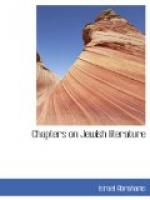An unexpected result of Manasseh ben Israel’s zeal for the promotion of Hebrew studies among his own brethren was the rise of a new form of poetical literature. The first dramas in Hebrew belong to this period. Moses Zacut and Joseph Felix Penso wrote Hebrew dramas in the first half of the seventeenth century in Amsterdam. The “Foundation of the World” by the former and the “Captives of Hope” by the latter possess little poetical merit, but they are interesting signs of the desire of Jews to use Hebrew for all forms of literary art. Hence these dramas were hailed as tokens of Jewish revival. Strangely enough, the only great writer of Hebrew plays, Moses Chayim Luzzatto (1707-1747), was also resident in Amsterdam. Luzzatto wrote under the influence of the Italian poet Guarini. His metres, his long soliloquies, his lyrics, his dovetailing of rural and urban scenery, are all directly traceable to Guarini. Luzzatto was nevertheless an original poet. His mastery of Hebrew was complete, and his rich fancy was expressed in glowing lines. His dramas, “Samson,” the “Strong Tower,” and “Glory to the Virtuous,” show classical refinement and freshness of touch, which have made them the models of all subsequent efforts of Hebrew dramatists.
Manasseh ben Israel did not allow himself to become absorbed in the wider interests opened out to him by his intimacy with the greatest Christian scholars of his day. He prepared a Spanish translation of the Pentateuch for the Amsterdam Jews, who were slow to adopt Dutch as their speech, a fact not wonderful when it is remembered that literary Dutch was only then forming. Manasseh also wrote at this period a Hebrew treatise on immortality. His worldly prosperity was small, and he even thought of emigrating to Brazil. But the friends of the scholar found a post for him in a new college for the study of Hebrew, a college to which it is probable that Spinoza betook himself. In the meantime the reports of Montesinos as to the presence of the Lost Ten Tribes in America turned the current of Manasseh’s life. In 1650 he wrote his famous essay, the “Hope of Israel,” which he dedicated to the English Parliament. He argued that, as a preliminary to the restoration of Israel, or the millennium, for which the English Puritans were eagerly looking, the dispersion of Israel must be complete. The hopes of the millennium were doomed to disappointment unless the Jews were readmitted to England, “the isle of the Northern Sea.” His dedication met with a friendly reception, Manasseh set out for England in 1655, and obtained from Cromwell a qualified consent to the resettlement of the Jews in the land from which they had been expelled in 1290.




